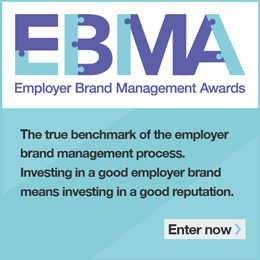Opinion: "How do you get your CEO to embrace the power of an employer brand?"

Measuring the success of your employer brand strategy could help with senior buy-in. Despite this, companies are largely failing to employ effective measurement in this area, says Ingrid Brown
Many of today’s most celebrated and successful companies have a strong outward-facing brand, and a powerful, inward-facing employer brand, in common, no matter what sector they operate in.
A well-developed employer brand is just as important as an external one, as it turns employees into the embodiment of a company’s culture. Employees become strong brand advocates acting as ambassadors with clients and prospects, and just as importantly, with potential future hires. With everyone in the business aligned on brand, projecting a consistent and coherent image and working towards the same goals, overall performance is enhanced.
Google is a great example. It has created a powerful culture that attracts the best people, to whom it clearly communicates its vision and values, which they then project into the marketplace. This attracts more talent, because it has helped to build Google’s reputation as one of the best businesses to work for, maintaining the company’s position as one of the world’s leading employer brands year after year.
Developing such a strong employer brand requires strong collaboration between communications, marketing and human resources, which many companies fail to achieve. It’s vital that these disciplines combine their respective talent and resources to develop a clear and coherent vision and values that are not only projected into the marketplace, but also reflected internally. HR can provide the people data, marketing can create the messaging that will engage and internal comms can embed the programmes.
However, for an employer brand to be developed and deployed most effectively, it requires buy-in from the leadership team. So how can you get your CEO on board? You need to demonstrate the power of the employer brand through research, examples like Google and the measurement of the strength of your own culture.
Emperor has commissioned research with Communicate magazine and Rethink Group that explores the role and management of the employer brand within over 120 businesses across a range of sectors. It reveals the key benefits that a well-developed employer brand brings to a business. In order of importance, these are:
1. Attracts quality talent
2. Retains quality talent
3. Helps a business stand out from its competitors
4. Contributes to commercial success and increase productivity
5. Communicates company values
6. Manages reputation
7. Supports change management
No one would argue that any of the above do not drive success, nor would anyone underestimate the edge that developing these assets would give their business – or that of their competitors.
It’s vital to measure the strength of your existing employer brand, to demonstrate the level of work that needs to be done. Only 30% of businesses questioned in the study said the level of awareness that exists internally with regards to their brand values was high or very high, with 70% saying it was average to very low. A key factor in convincing your leadership team to act is to show them where your business sits.
The study also found that there is more than one definitive way of doing this. Companies use factors as wide-ranging as attrition rates and internal surveys to measure employer brand value. However, more than eight out of 10 respondents reported that their metrics for measuring employer brand management could be improved. These issues indicate that businesses need to find a more effective method for measuring success.
With four out of five of the UK’s leading companies committed to employer branding and looking to make it a priority within their business, effective measurement will be high on the agenda going forward. However, one thing is certain: to achieve this, communications, marketing and HR need to be aligned. Only when your CEO is committed to the building of your employer brand, will you be able to develop a strong culture that will complement and support your external brand and help you attract the best people to ensure sustainable success going forward.
As Peter Drucker said, “Culture eats strategy for breakfast.” Anyone can come up with a strategy, but it’s much harder to build a winning culture. Moreover, a brilliant strategy without a great culture is all talk and no action, while a company with a winning culture can succeed even if its strategy is mediocre. Get your employer brand right and the strategy will follow.
Ingrid Brown is business development director, brand and communications at Emperor. She will be speaking at the Employer Brand Management conference on 9 December.




